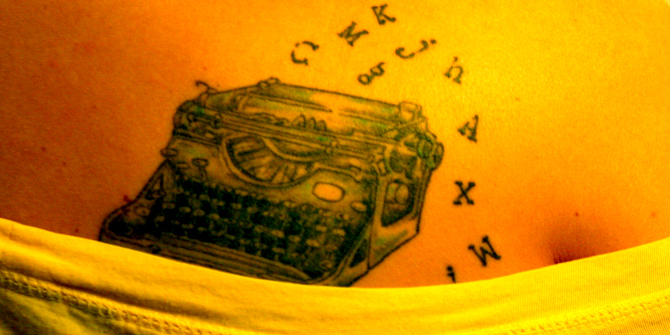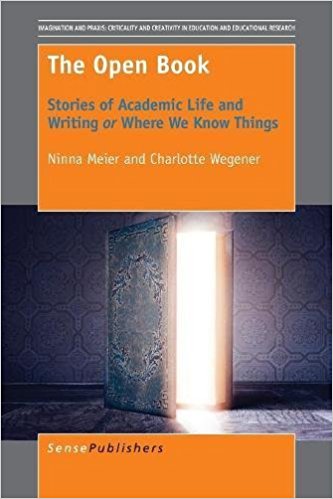In The Open Book: Stories of Academic Life and Writing or Where We Know Things, Ninna Meier and Charlotte Wegener offer an experimental co-memoir that blurs, unhooks and reweaves the relationship between ‘academic’ and ‘creative’ writing, while also disturbing traditional divisions between professional and personal life. The book succeeds in bringing emotion and empathy to academic writing, writes Vanessa Longden, and prompts reflection on personal practice.
The Open Book: Stories of Academic Life and Writing or Where We Know Things. Ninna Meier and Charlotte Wegener. Sense Publishers. 2017.
In an academic climate where the purpose and value of research are increasingly scrutinised and regulated through government policy, The Open Book: Stories of Academic Life and Writing or Where We Know Things is the first book in a series of publications and projects from the Open Writing Community. This emphasises the importance of interdisciplinary collaboration among academics from different disciplines and countries. The book asks: what can we learn from one another, as researchers and as human beings? How can we remove the ‘filter’ of academic writing and expose the thought process behind ‘all these references and neat sentences’ (86)? Research, the authors argue, has the potential to be revolutionary if we ‘tell the truth’ and remember to listen (86).
While Ninna Meier and Charlotte Wegener are situated institutionally at Aalborg University in Denmark, they write from various positions in space and time to which a general audience could relate. The authors offer a glimpse into the complex relationship between academia and the production of knowledge. Often, their writing is inextricably linked with the materiality of their bodies and with each other. A single authorial voice is frequently indistinguishable as Meier and Wegener’s memories, dreams and personal experiences converse and amalgamate, becoming something different entirely. This is an example of contemporary women’s history: a ‘fearless collaborative investigation of being a woman’ where the individual voice immerses into ‘one collective writing body’ from which it draws strength (12). While the purpose of a review is to offer some form of clarity, I am left questioning how this can be achieved when the (albeit constructed) boundaries between ‘academic research’ and ‘creative’ writing are thoroughly blurred, torn apart, unhooked and rewoven. Preconceived categories become increasingly uncertain when ‘over-flexible minds’ become their research topic (19).
The authors are clear: ‘This is not a story of cause and effect’; so I decided to approach my task thematically through three core themes: bodies, places, and experiences (27). Written from the sick-bed, Chapter One considers ways of re-inscribing the body that resist traditional dualisms: feelings and thoughts; the professional and private; pleasure and pain. Acknowledging that our bodies are entities with needs, cravings, desires and limitations is just one part of the process. ‘Today, I have a fever,’ the author writes. ‘My body is right here. I really missed it and needed it to make my work work’ (1). Taking care of the body is not an easy task, and is often eclipsed by everyday responsibilities, like the need to take care of others as well as the need to write. This is most evident when the authors discuss their personal accounts of grief, loss and longing, such as the passing of one’s mother and separation from partners. Painful yet transformative moments, the authors argue, are known more in the depth of the body than the mind.
 Image Credit: (Amy Guth CC By 2.0)
Image Credit: (Amy Guth CC By 2.0)
Where these realisations take place is just as significant as the body that experiences them. Chapter Two, ‘What If Knowledge Is Also Tied to Places?’, considers how cognition is often shared and distributed among people in wider social settings. The space-body-knowledge relationship is mediated across geographical areas; meanwhile, the tension between knowing and not knowing has wider social implications for research. One place to which readers are continually returned in the book is the emblem of the house. We visit the yellow-brick villa with the red-tiled roof and its ‘funny’ crescent-shaped window through dreams, thoughts and driving (9). This section echoes Gaston Bachelard’s Poetics of Space (1958), whose words continue to be applicable in contemporary times. In an attempt to move forwards, the house is decluttered and sold, only to be metaphorically ‘burnt down’ in the following chapter. The point is that ‘progress’ is neither certain nor a straight line. By burning down the house, the authors also torch old, restraining notions of the self and observe ‘new things’ that ‘grow out of the black, fertile soil’ (31).
Ultimately, writing about personal experiences in academic research does not create a coherent life story. Instead, writing offers a way of ‘making sense’. The act makes thoughts, feelings, people and places overlap, where elements are reinvented through real and imagined landscapes (2). In this sense, academic research is kaleidoscopic, ever-shifting and changing. But this is not to say that the publication is not analytical: it is, but often in subtle and nuanced ways. The Open Book offers personal insights and reflections on how academic work, carried out at a particular point in time and space, is simultaneously free from these dimensions.
Research ‘travels beyond the author’s control to reappear in multiple locations’, through others’ research which is both physically and digitally inscribed (33). The authors not only interrogate the value of embodied research, but also ask: ‘what if we actually have the answers and what we are looking for are the questions?’ (24). At the beginning of this review, I questioned how I was going to write. My words merely scratch their surface of what this book has to offer. The text is provocative and the reader – whether a student, early career researcher or a more established academic – will be left with more questions than answers. However, answers are not the point: The Open Book is just the beginning of the conversation in this series, and it is much more than its 88 pages in length. While I chose to review this book (or did it choose me?), I was not prepared to be so emotionally moved, and I feel grateful to have shared a small part of the authors’ intimate experiences.
But I question when the book ceased being about Meier and Wegener, and when it started to become about me? Was I not at a point in my research that I wanted, needed, something else to take me out of my routine and my comfort-zone? Something that would challenge me, move me, make me pause to take a breath – a sigh of relief – and say: ‘not just me’. One of the book’s successes is its ability to bring emotion and empathy to academic writing and to prompt deliberation on personal practice. The Open Book is a reaction to, and a reflection on, the messiness of lived experience where the cultural baggage we carry and move with is a deep source of inspiration. Our experiences are different, but our embodied roots and passion for research are, undoubtedly, the same.
Vanessa Longden is a Leverhulme funded doctoral candidate, researching Visual Arts and Culture at Durham University. Her thesis readdresses the spatial representation of Francesca Woodman’s photography in the cultural context of 1970s New York. Longden has presented her work internationally, and recently published ‘Whispers of escapades out on the “D” train’: The Entangled Visions of Cindy Sherman’s ”Untitled Film Stills”’ in Mediated Pasts: Visual Cultures and Collective Memory, McFarland & Co Inc. (2017). For the past three years, she has acted as Editorial Assistant for The Journal of Historical Sociology (Wiley-Blackwell). Read more by Vanessa Longden.
Note: This review gives the views of the author, and not the position of the LSE Review of Books blog, or of the London School of Economics.


 Find this book:
Find this book: 





1 Comments